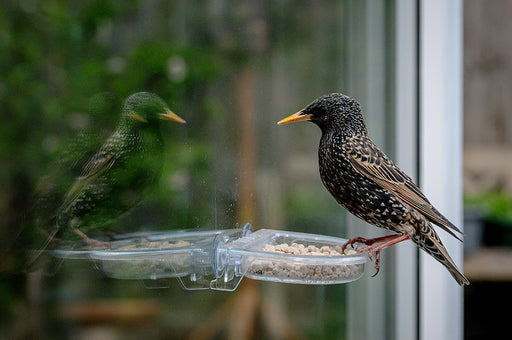How to Get Rid of Moths in Bird Seed

Have pesky moths been infiltrating your bird seed? Bird seed moths, more commonly known as Grain Moths or Pantry Moths, are pests that are often found in birdseed and other dry goods. Although you may find a few dead moths or their larvae in your birdseed, it doesn't necessarily mean that you need to throw out the whole batch. In fact, most birds consume moths and other insects as part of their well-balanced diet. So, you can feel free to feed any infested birdseed to your aviary friends. However, if you have a major infestation, you may need to throw out your birdseed and take precautions to ensure it has not spread to other foods or stored items.
The presence of moths in your dry goods is never a good thing. While birds may find moth larvae to be a tasty treat, humans are less likely to want to snack on these little insects or their larvae. As such, it is best to immediately take action to prevent a moth infestation from spreading. Now, let's talk about how to get rid of bird seed moths.
Identifying a Bird Seed Moth Infestation

First off, you must identify the infestation. Birdseed moths actually have a scientific name, Plodia Interpunctella (Indianmeal Moth). You can tell if you are dealing with these moths by looking at their colour and location. If you see small moths or little brownish worm-like larvae in bird seed, this is a sign that you have an infestation.
Adult moths lay microscopic eggs in birdseed or other grains. The eggs hatch into hungry larvae that grow to about a quarter of an inch long. These larvae are tubular with tan-coloured bodies with brown heads. Pantry Moth Larvae love to feast on grains such as birdseed. They enjoy a range of other animal feeds and pet foods as well.
When fully grown, the larvae will spin web-like cocoons and enter the pupa stage. From there, they metamorphosize into adult moths, and the cycle repeats. If you see adult moths fluttering around, larvae, and/or cocooned pupae in your birdseed, you can be sure that a bird seed infestation is present.
Bird seed/grain moths can infest:
- Bird seed
- Dry corn and barley
- Oats
- Cat food or dog food
- Animal feed
- Flour
- Cereal
...and an array of other dry goods.

Why are Moths in Bird Seed & What Attracts Moths to Stored Dry Goods?
Moths will seek out dry goods to lay eggs in just about anywhere. Moths thrive in dark and quiet places. If you have any dry food items stored in an area that is relatively quiet and free of activity during the evening hours, moths will probably find their way in at some point. Seed and grain-eating moths are present in every state in America and in most places in Canada as well as Europe.
How to keep grain moths out of bird seed?

The best thing to do is store your dry goods in sealed, airtight containers. This goes for cat food, dog food, birdseed, flour, dried fruits and vegetables, grain, etc. As long as the container that you store food in has an airtight seal, moths will not be able to get in. Pantry Moth Traps , moth repellent herb sachets, and cedar pellets or chips can help to make your space less attractive to these winged pests.
Where to find traps for bird seed moths?
Bird seed Moth Traps can be purchased at most farm and garden stores, online, or at most places where insect/pest control supplies are sold.
Can you get moths from bird seed?
Yes, it is possible to bring an infestation from the garden store to your pantry. If a bag of seed is infested with moths when you buy it and bring it home, these moths can mature into adults. The adults mate and lay eggs in areas around your home. Specifically, they can infest your pantry or places where you store food. If you ever see live Moth Larvae crawling in birdseed, don't buy it.

About MothPrevention
MothPrevention® speak to customers every day about their clothes moth issues - clothes moths are a species that are ever increasing and that can cause significant damage to clothes, carpets and other home textiles.
To date, we’ve helped over 250,000 customers deal with their moth problems. We have developed professional grade solutions including proprietary pheromones and trap design engineered to the highest production standards.





